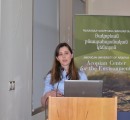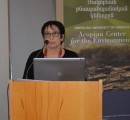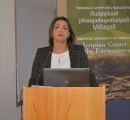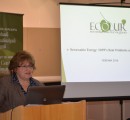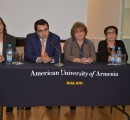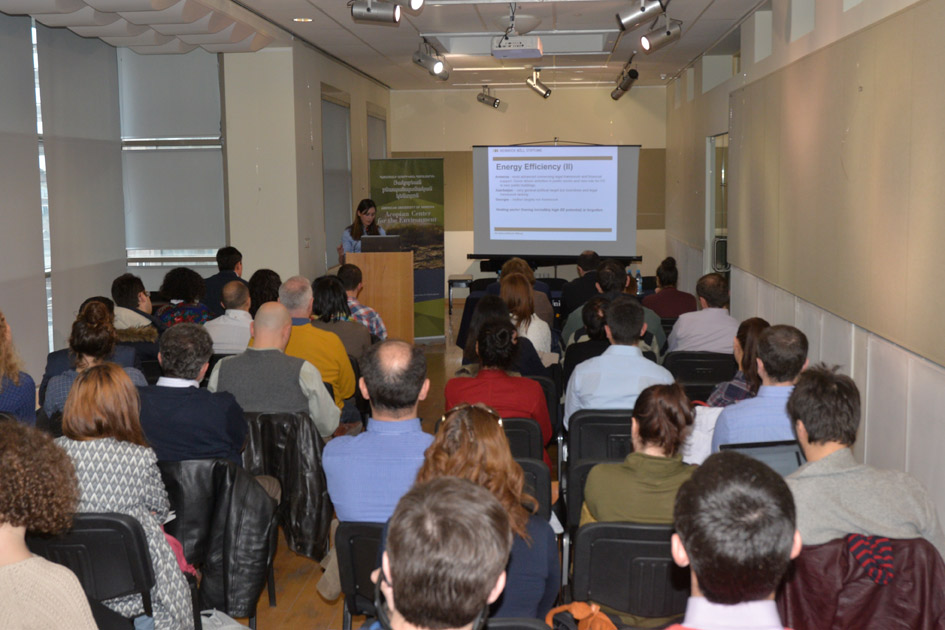
Sustainable Energy Systems in the South Caucasus: Reality or Illusion?
2 min readYEREVAN, Armenia – The AUA Acopian Center for the Environment and the Heinrich Boell Foundation South Caucasus co-organized a public discussion on “Sustainable Energy Systems in the South Caucasus,” a study conducted by the Heinrich Boell Foundation in 2015. The February 25th event, taking place at AUA’s Akian Art Gallery, touched on the challenges that the three countries of the South Caucasus – Armenia, Azerbaijan and Georgia – face in making headway in adopting renewable energy and energy efficiency solutions.
“Compared to its neighbors, Armenia has taken the most significant steps forward in terms of developing supportive legal and economic frameworks for renewable energy and established basic energy efficiency standards in the building sector,” said Ms. Tamara Antidze, the sustainable energy project coordinator at the Heinrich Boell Foundation South Caucasus based in Tbilisi, Georgia.
Even in Armenia, however, current investment plans and supportive financial and regulatory incentives are yet to be better shaped for wider expansion of renewables and better efficiency of energy use continues Ms. Antidze.
Ms. Antidze’s presentation was followed by comments from four discussants from Armenia. These included Mr. Hayk Harutyunyan, Deputy Minister of Energy and Natural Resources of Armenia, Ms. Diana Harutyunyan, UNDP Climate Change Program Coordinator, Ms. Astghine Pasoyan, Independent Expert in Energy Efficiency Issues, and Ms. Inga Zarafyan, Ecolur NGO.
Mr. Harutyunyan highlighted Armenian government’s recognition of renewable energy and energy efficiency as significant pillars of national energy policy. He also discussed the legislative and other types of support needed to enhance the transition to sustainable energy in the region. This includes financing mechanisms and instruments that are appropriate for energy-efficiency investments.
Ms. Hartyunyan presented sustainable energy issues within the context of global climate change policies and obligations that Armenia has taken on in the 2015 climate change agreements in Paris.
Ms. Pasoyan emphasized the energy savings and efficiency potential that Armenia can harness if Armenia’s existing policies are implemented and adequately pursued. More than 35% in energy savings is expected if Armenia implements the recommendations of its 2015/16 Second National Energy Efficiency Action Plan (NEEAP).
Ms. Zarafyan highlighted the challenges of sustainable energy specially when environmental and social concerns are not adequately considered. She presented the findings of monitoring they have conducted on the small hydropower plants built rapidly in the past decade.
The AUA Acopian Center for the Environment (AUA ACE) is a research center of the American University of Armenia. AUA ACE promotes the protection and restoration of the natural environment through research, education, and community outreach. AUA ACE’s focus areas include sustainable natural resource management, biodiversity and conservation, greening the built environment, clean energy and energy efficiency, as well as information technology and the environment.
Founded in 1991, the American University of Armenia (AUA) is a private, independent university located in Yerevan, Armenia and affiliated with the University of California. AUA provides US- style education in Armenia and the region, offering high-quality, graduate and undergraduate studies, encouraging civic engagement, and promoting public service and democratic values.

